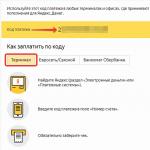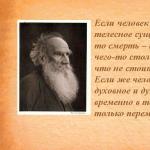Reading rules in English. English letters and their transcription
is there any rule for the letter "i"? when "ah" and when "and"? or is there just to remember these words ...? and got the best answer
Answer from Ўliya Shchenyavskaya [guru]
The reading of a vowel depends on the type of syllable and on whether or not the stress falls on it.
Syllables in the words of the English language are divided into open and closed.
An open syllable is a syllable in which:
- a stressed vowel ends a monosyllabic word: hi (hello)
- the stressed vowel is followed by another vowel (dumb e): pie, lie, tie.
- the stressed vowel is followed by a consonant and a vowel (mute e): time, ride, Mike
In an open syllable, the vowel is read as in the alphabet: die, pike, like, dive, hide, i = ay
A closed syllable is a syllable in which:
- the stressed vowel is followed by one consonant: fit, big
- the stressed vowel is followed by a doubled consonant: kiss, miss
- a stressed vowel is followed by two or more consonants: middle, milk, since
In a closed syllable, the vowel is read briefly: hit, i = and
You asked when the letter i is read as [ah] and as [and]. These are exactly the 1st and 2nd types of syllables, but i can also be read [ə:] - bird, girl, firm, shirt and - tired, fire , hire, iron, this is already the 3rd and 4th type of syllable, respectively. You did not ask about other variants of reading the letter i, but in addition I will add the following.
Vowel pronunciation changes under the influence of sonic sounds and some noisy consonants. A special role among them is played by the sound [r], which lengthens and expands the preceding vowel. The sound [r] itself is not pronounced.
Thus, when classifying different variants of vowel reading, there are four main types of vowel reading in a stressed syllable.
Type I syllable alphabetical reading of a vowel in an open syllable.
Type II of a syllable - a short reading of a vowel in a closed syllable.
III type of syllable - reading a vowel in combination vowel + r (+ consonant) i = [ə:]
IV type of syllable - reading a vowel in combination vowel + r + vowel. i =
Answer from Ѐita[guru]
In an open syllable under stress - "ah", without stress "and"
In a closed syllable with or without stress - "and"
An open syllable is called if there is no consonant after i or there is (except for r, this is a separate case) but after this consonant there is a vowel.
Examples: I, ice, life, rice, etc.
You need to remember the words of the exception to the rule, for example: find. The syllable is closed, but reads like "ah".
In some cases, i may not even be pronounced.
I simplified this, of course, all this is true only if i is one. There are rules for i combined with other vowels or the r following it. For example, in the -tion suffix, the combination io is either not pronounced at all, or pronounced as a weak sound e, reminiscent of a, at your discretion.
Answer from Ўriy Karanda[guru]
There are rules for reading. In the alphabet it is read "ah", and it is also read in words with an open word type. (which end with e)
Answer from Yegina Golovatyuk[guru]
and I generally did not learn these rules, I just knew how words are read and everything, and in the same way. I entered)
Answer from 3 answers[guru]
Have you heard of open and closed syllables? This is when we are convinced that if after a vowel there is a consonant, and then another vowel, often "e", then that first vowel sounds the same as its alphabetical name. If a vowel is blocked by consonants, it has its own "second" sound.
For example:
- Fin - fine
- Pin - pine
- Twin - twine
- Tim - time
- Win - wine
- Tip - type
Or this consonant is not worth it at all
- Pie
- Tie
- Rye
Well, of course, there is also -ight, -ild, -ind, where, for the opposite case, -ion, -ism, -ist, and the third stressed open syllable from the end of the word is read briefly (as conditionally closed).
It's all good ... for the time being. But then you start meeting along with ice, mice, lice, nice, slice [everywhere ai] such words as police, justice, Alice, notice [i].
Then words appear where the letter "i" seems to be adjacent to another vowel through a consonant, that is, it should be in an open syllable and read, but despite this it sounds like [i]: typical, definitely, military, engine, expedition, pyramid, idiot, linen .. do you think that's all? It would be too good, but you will definitely come across such words. It also happens the other way around: the syllable seems to be closed, but it sounds all the same: climb, pint, mic. And the excuse about "exceptions" will not work. There are no exceptions that are not ALL known in advance and are not included in a separate list. This is not an exception, it is a signal that the rule about open and closed syllables is far-fetched. Of course, it has some right to exist, because in some cases it still works.
The rule gains a penny more thanks to words such as live, wind, which are read both ways.
There is also alternation:
- Wild - wilderness
- Crime - criminal
Unsurprisingly, students who are confused by the unpredictability of reading the insidious letter "i" over and over again read with errors *.
- Arrived: Arrived instead of arrived
- Since: sense instead of sins (of course, there is also science, but this is a completely different word)
- Skiing: skying (ski is skiing, sky is sky, and this is sky, skying is already "fly away")
- Climb: climb,
- Diet: diet,
- Pyramid
- Dining room
- Ti (tie tie-tie, actually, ti, tea is tea)
- Typical
- Cyrop
- Iceland
- Psychology
- Determined
- Notice
- Exitid
- Child and Children
- Definetli
- Finals
- Esingment
- Idiom
- policy
- river
- librari
But there is also:
* It is worth noting that if among the words below you find your favorite mistakes, do not be upset, you are not alone, these incorrect pronunciations are common to all foreigners learning English remotely and do not have a specific "inventor" (there is only a specific "collector" - your humbly servant) therefore, this list aims not to laugh at a specific student, but to help you remember how not to speak.
Therefore, if you come across words with the letters "i", "y", check the pronunciation (not the translation) in the transcription dictionary or on the sites: forvo.com, thefreedictionary.com, wooordhunt.ru, en.wiktionary.org. And, of course, do not forget to attend classes in Intensive (intensive.ru)
Now let's do the exercise. You are given words, decide: how the letters "i" or "y" sound in them. The answers are below. Try to do this without looking at the answers. Good luck.
[i] or accompanied, achieve, advice, anxiety, apply, application, archive, arrive, assignment, Bible, biblical, bicycle, biology, by, child, children, Christ, Christmas, city, climate, climb, climber, crime , criminal, crisis, critic, cycle, cynical, decide, decision, define, definitely, determined, dial, Diana, diet, dining, dinner, dioxide, diver, driven, dynamite, engine, examine, excited, expedition, eye, fiancée , finally, find, fly, fry, grind, hi, hibernate, high, hydrant, Iceland, idea, idiom, idiomatic, inspiration, inspire, ion, iphone, island, isolated, italic, Italy, item, justice, kind, king , library, linen, lit, liver, mic, microphone, mild, military, mime, mimic, mind, mini, Nickleby, ninth, notice, oxygen, pigeon, pint, police, policy, polite, prison, private, psychiatrist, psychology , pyramid, recipe, rhinoceros, rid, ride, rival, river, satellite, science, Siberia, sign, signature, Simon, since, ski, sky, society, stamina, symbol, syrup, tie, tiny, tired, trip, try , t ype, typical, tyrant, via, vibrant, vice, vicious, vintage, width, wild, wilderness, windmill, write, writing, written.
[i] - accompanied, achieve, application, Biblical, bicycle (syllable 2), children, Christmas, city, criminal, critic, cynical, decision, definitely, determined, dinner, driven, engine, examine, expedition, fiancée idiom, idiomatic , inspiration, inspire (syllable 1), italic, Italy, justice, king, linen, lit, liver, military, mimic, mini, Nickleby, notice, oxygen, pigeon, police, policy, prison, psychiatrist (last syllable), psychology (last syllable), pyramid, recipe, rid, river, signature, since, ski, stamina, symbol, syrup, trip, typical, vicious, vintage, width, wilderness, windmill, written.
Advice, anxiety, apply, archive, arrive, assignment, Bible, bicycle (syllable 1), biology (syllable 1), by, child, Christ, climate, climb, climber, crime, crisis (syllable 1), cycle, decide, define, dial, Diana, diet, dining, dioxide, diver, dynamite, excited, eye, finally, find, fly, fry, grind, hi, hibernate, high, hydrant, Iceland, idea, inspire (syllable 2), ion, iphone, island, isolated, item, kind, library, mic, microphone, mild, mime, mind, ninth, pint, polite, private, psychiatrist (syllables 1,2), psychology (syllable 1), rhinoceros, ride, rival, satellite, science, sign, Simon, sky, society (second syllable), tie, tiny, tired, try, type, tyrant, via, vibrant, vice, wild, write, writing.
Reading rules in English are extensive and complex, as There is a huge discrepancy between letters and sounds: 26 letters and 44 sounds, so different letters in different positions produce different sounds, which in English are conveyed by conventional symbols called transcription signs. In this post, to facilitate the assimilation of the reading rules, we denote them partially in Russian letters.
4 basic types of vowel reading
To begin with, we will master the 4 main types of reading vowels E, A, Y, U, O, I in stressed syllables in English
Google shortcode

I reading type - open syllable ( open is a syllable ending in a vowel, even if it is not pronounced)
Pay attention to the first line of the table. The words same, note, he, fine, my, cube, like all words of this category, end in a mute vowel, and the reading of vowels at the root of the word coincides with the name of the letters according to the alphabet. Thus, words with dumb vowels at the end, i.e. words of the 1st reading type same, note, he, fine, my, cube, will sound like "diet, laptop, hee, fine, may, cube"
Let's consolidate the reading of vowels in a stressed syllable with the following exercise:
Note, lone, mice, rice, type, tune, shy, lay, say, he, hay, name, same, nine, nice, game, came, make, Kate, Pete, five, tie, life, eve, me, size, no, cope, smoke, rose, nose, spine, sly, cry, vine, maze, home, tube, made, fume, cube, pace, lace, sky, hale, spine.
II reading type - closed syllable (a syllable ending in a consonant is considered closed). This is the second line in the table. Pay attention to the words rat, hot, red, bit, myth, run, at the end of which there is no mute vowel. These words sound like "Rat, Hot, Ed, Beat, Miss, Ran."
Cap, pen, bed, ten, not, spot, lot, bad, rat, sit, send, test, pit, in, send, spell, tin, less, ban, mad, fat, Sam, land, did, fit, sat, pet, tin, slip, sad, glad, bag, jam, gap, lag, can, kin, Jim, Jack, yes, ink, cup, run, cod, spin, not, doll, hop, hot, bank, rank, spin, up, us, bus, bun, cut, fun, vet, well, but, nut.
III type of reading - vowel + letter "r" , which affects the sound of the vowel at the root of the word, giving it some length. So the words car, sort, term, fir, Byrd, fur sound like "ka: co: t, te: m, fe: be: d, fe:".
stern, Far, curt, hard, hart, car, card, cart, fork, cork, work, sort, term, first, Byrd, furs, curl, her, curb, turn, girl, sir, burn, turn, word, born, torn, bird, form, serf, herb.
IVreading type - vowel + letter “r” + vowel. The letter "r" in this case is also not readable; all three vowels together sound like this: care, store, mere, tire, cure - "kea, hundred :, mie, taie, kyue."
Fare, here, pure, rare, cure, during, mare, fire, bare, mire, stare, tire, sere, mere, store, core, more, care.
In modern English, there are 26 letters that give 46 sounds, therefore, many English letters have more than one reading option. In the course of this lesson, we will continue to familiarize ourselves with the rules for reading English letters. We will consider the peculiarities of reading the vowels I and Y in open and closed syllables.
In a closed syllable, the letters I and Y are read as a short sound [ɪ]. By the way, a closed syllable is one that ends in one or more consonants (except for r). Here are examples of words in which I and Y are in a closed syllable:
milk - milk, kitten ["kɪt (ə) n] - kitten, pin - pin, mitten [" mɪt (ə) n] - mitten, lynx - lynx.
The vowel Y has its own reading characteristics. At the beginning of a word, before a vowel, the letter Y gives the sound [j]. Here are examples of such words: yard - yard, year - year, yes - yes, you - you, yoghurt ["jɔgət] - yogurt. The vowel Y is often found at the end of a word in an unstressed syllable. An unstressed syllable is a syllable that is pronounced with a lesser strength and length than stressed. In this position, the vowel Y is pronounced as a short sound [ɪ]. Here are examples of such words: baby ["beɪbɪ] - child, cherry [" ʧerɪ] - cherry, teddy ["tedɪ] - teddy bear ( Fig. 2.), puppy ["pʌpɪ] - puppy, lady [" leɪdɪ] - lady.
So, now you know how to read the English vowels I and Y in open and closed syllables.

Rice. 2. Teddy bear ()
You already know that the vowel E in an open syllable reads like a long sound. Now you have learned that the vowel I in a closed syllable gives a short sound [ɪ]. It is very important to pronounce short and long sounds correctly in English, as the meaning of words often depends on this. For example, sheep [ʃ iː p] - sheep and ship [ʃ ɪ p] - ship.
The letter combination EA also gives a long sound, for example bean - bob. But if you say this word with a short sound [ɪ], you get a completely different word bin - a trash can. In English there are two similar verbs, the sound of which differs in the length of the sound "and": the verb leave - to leave, to leave, to leave something and the verb live - to live. Please note that the word live is not read according to the rules you know, since this is an exception.
In an unstressed syllable, most English vowels turn into short, blurry sounds. After examining the table (Fig. 3.), you can notice that vowels in an unstressed syllable are most often read as short sounds [ə] and [ɪ]. 
Rice. 3. Reading vowels in an unstressed syllable
The letter A in the word chocolate (chocolate) and the letter O in the word computer (computer) are in an unstressed position and are read as a short sound [ə]. The E in basket, the U in minute, the I in dolphin, and the Y in baby are also in the unstressed position and are read as a short sound [ɪ]. In some cases, vowels in an unstressed position are not pronounced at all, for example, in the word kitten ["kɪtn] the letter E is not pronounced. If the letter O is in the open position at the end of a word, then it is read as in the alphabet, even in an unstressed syllable:
radio ["reɪdɪəu] - radio, tomato - tomato.
Bibliography
- Afanasyeva O.V., Mikheeva I.V. English. Grade 2 - M: Bustard, 2014.
- Biboletova M.Z., Denisenko O.A., Trubaneva N.N. English. Grade 2 - Title, 2008.
- Bykova N.I., Dooley D., Pospelova M.D. and other English language. Grade 2 - Education, 2013.
- Alleng.ru ().
- Alleng.ru ().
- Learnathome.ru ().
Homework
- Learn to read all the words from the video tutorial correctly.
- For each correct reading of the vowels I and Y, find two English example words.
- Learn the words from the video tutorial and new words that you find.
Letter Ii not in vain called
- "HEY", so it is read, but ... not always.
And the English short sound [i]- "And" is spelled as a printed lowercase letter for a reason i... Letter Ii can be read [i].
We read the letter Ii in open and closed syllables and combination of letters igh:
*** The reading of English vowels is influenced by other letters that make up the word (see). How a letter or a combination of letters in an English word is read is accurately shown by the transcription signs - the icons inside square brackets.
Here are some examples open syllable, after the letter i there are no other letters and it is readable :
One letter word I always written with a capital letter and reads = "AI" - this is the pronoun "I"
hi- - "hi" - hello
Closed syllable, after the vowel i there is a consonant that "closes" the vowel, makes the syllable closed. Letter i read [i]:
big- "BIG" - large
pin- "PIN" - pin
But if you add a vowel at the end of such a word, for example, a dumb letter e, the syllable will be open:
pine- "PINE" - pine
Vowel e at the end of such words is not read, but forms the second syllable. The first stressed syllable is open:
Read:
The letter combination igh is read:
h igh- high
h igh t - height
l igh t - light
n igh t - night
br igh t - bright
...
*** Remember the letter combination gh ( t) - "ji-heych (ti)". It also occurs with other vowels, for example:
dau ght er ["dɔ: tə] - daughter
lau gh- laugh
bou ght- bought
bou gh- bitches
plou gh- (British) plow (Amer., plow)
borou gh[ˈBʌrə] - (small) town, ...
and [i] !!!
Do you memorize the transcription signs ("AI") and [i]("AND") ! ?






